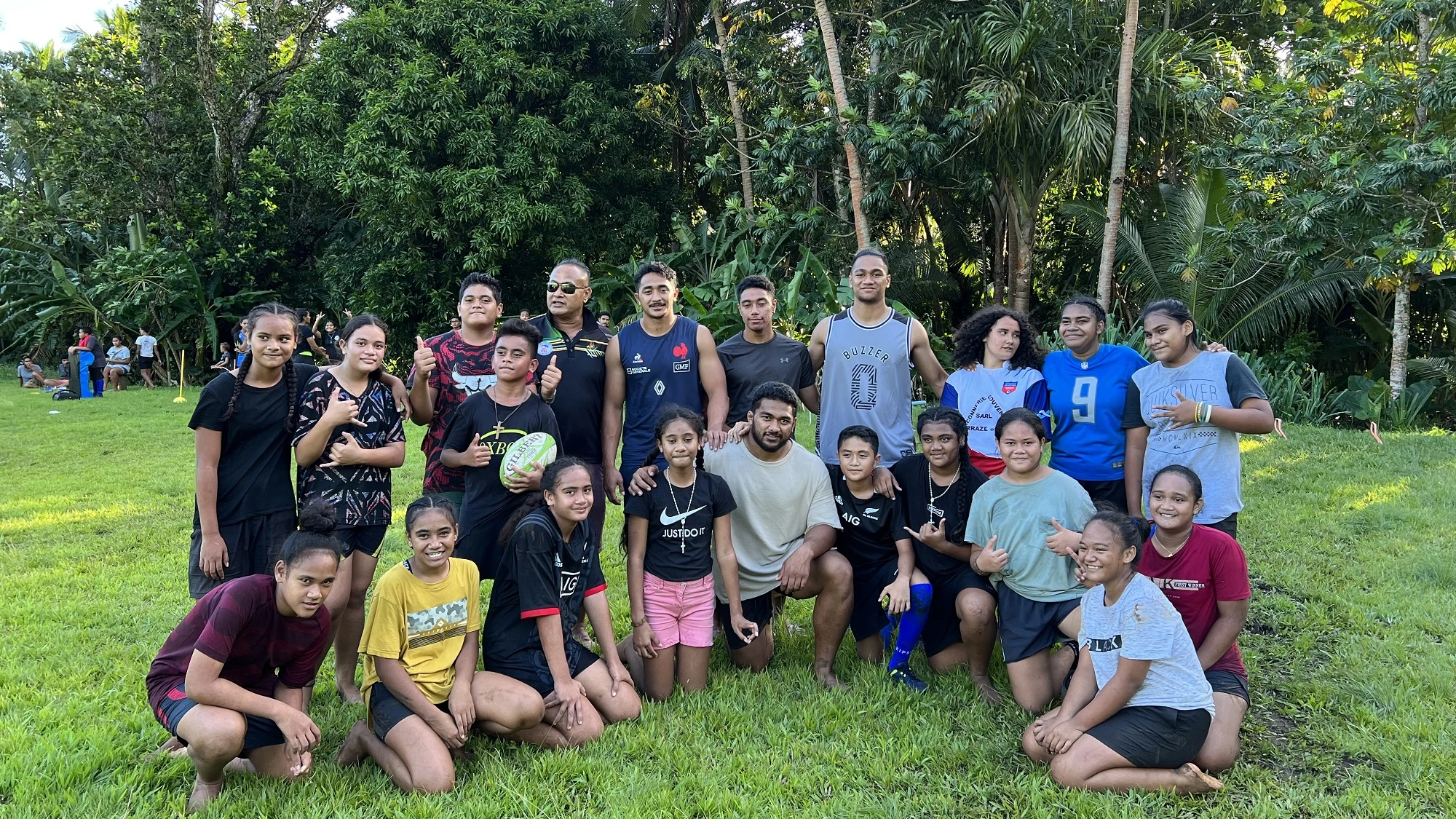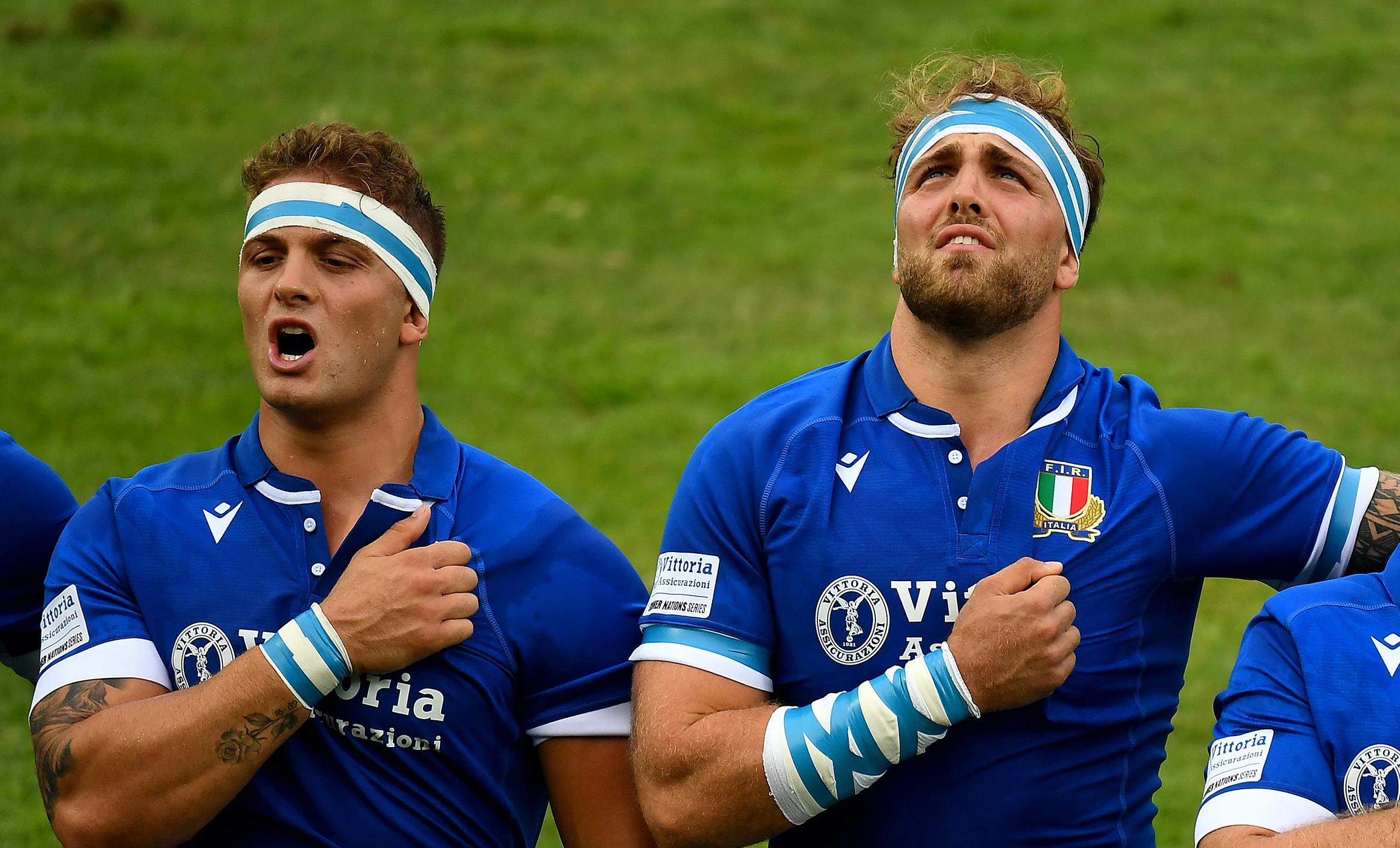Every rugby player goes on a journey to reach the highest level but few have travelled as far at such an early age as France centre Yoram Moefana.
The inside centre was just 13 years old when he left his native Wallis and Futuna, a French overseas territory in the South Pacific, and flew more than 10,000 miles to metropolitan France.
There he joined his uncle Tapu in Limoges, and by the age of 20, he was a full France international.
Now, still only 22, he has established himself as a fixture in the French matchday squad and has a Grand Slam under his belt.
In 2022, only Damian Penaud played more minutes for Les Bleus as they went unbeaten for the first time in their history, while Moefana has also played every minute of this year’s Guinness Six Nations.
Even more remarkable, on Sunday in Paris, Moefana played more than an hour alongside his uncle, Sipili Falatea, France’s tighthead prop, the duo the latest contributors for France from Wallis and Futuna.
To put it into context, the territory that is situated between Fiji and Samoa has a population of 11,558 at the last count, approximately the same as Holyhead.
Moefana and Falatea have followed in the footsteps of prop Vincent Pelo in terms of players born in Wallis and Futuna to represent Les Bleus.
Peato Mauvaka, Romain Taofifenua, Sébastien Vahaamahina and the Tolofua brothers are also all full internationals with Wallisien heritage.
Look through the French age group sides, and the pipeline of talent is showing no signs of slowing down – it is remarkable considering the rugby playing population of the islands is somewhere between 250 and 300.
For Taofifenua Falatea, Moefana’s father and the older brother of Sipili, seeing the success of the island products inspires immense pride.
He explains: “We’re more than proud. For rugby in New Caledonia and the Pacific, what excites us most is what will come next, after these guys.
“I was the first one sent to metropolitan France from Futuna by Nisié Feleu. I was the first person on this pathway, I left in 2000.
“For my son, I was living in New Caledonia (about 2,000 miles away) at the time, while he was in Futuna. He called me when he was 13 and said: “Dad, I think I want to go to France with uncle, because I want to play rugby at a higher level.”
“We were surprised, but also amazed to some extent that a youngster could be so sure about what he wanted to do.”
Nisié Feleu, to whom Taofifenua Falatea refers, is in many ways the father of rugby in Wallis and Futuna. A former decathlete, he spent time in France where he got to know former France forwards coach Didier Retière, before returning home.
Once back in Wallis and Futuna, Feleu initially tried to bring athletics to the islands, before turning his attention to the oval ball.
He recalls: “When I was at university I got to know Didier Retière. Then when I returned home, I spent time with some priests from Samoa. They were surprised that there was no rugby in Wallis and Futuna at the time, it was in the 1990s. I tried to start some athletics clubs but it didn’t really take off. So I thought to myself, why not try rugby, given that we are in the middle of the Pacific, surrounded by people who play rugby. It took off.
“The first trips were to Samoa. Over time the parents got involved and everyone did. The majority of people who send me their children to play rugby at school, all started their rugby with me.”
Feleu created Afili Futuna, and it was there that Moefana first picked up a rugby ball alongside his uncles Sipili and Kito, who also plays club rugby in France.
Feleu recalls: “I saw him arrive with Sipili and Kito. Taofi (Moefana’s nickname) was six and the other two must have been between seven and nine. He wanted the ball all the time. If he didn’t score first time around, you would have to wait for him to run back around everyone behind all his teammates to try on the other side.
“Physically, he loved to run and was rapid. He wanted to play all the time, he never stopped. He’s always liked playing in space, but wasn’t afraid of contact either.
“He was one of those youngsters that you don’t really need to teach much, apart from the fact that he needs to pass now and again.
“We have New Zealand not far away, which is like France, except it’s next door. When Yoram was 11, we went to the 2011 World Cup. It was when he came back that he and his parents started thinking about the possibility of carrying on his development in France.
“The advantage was that he had family over there to help take care of him. We see the success that it became, but you don’t see all the sacrifices along the way, particularly from his mum, who accepted that her son should leave so young.
“From the perspective of those in France, it might have seemed worrying. But for us, family is the most important thing. Whether you are living with an uncle, an aunt, your grandmother, or whoever, the parents have total faith. The vision of family is much more important for us.”
So that was how Moefana, at just 13, set off for Limoges where he lived with his uncle Tapu, who currently plays in the French second division for Nevers.
All of Taofifenua Falatea’s brothers play in the pack, including tighthead Sipili. Moefana followed in the footsteps of his old man though, playing in the centres.
There were some setbacks along the way when he arrived at Limoges, both in terms of getting to grips with living 10,000 miles from home, as well as trying to make it at the highest level.
His father explained: “It was tough in those first months but my brothers and sisters were there to support him. He also had his mother’s brothers.
“He was really determined. If he’s got to the point he has today, it is in part because of the obstacles he faced along the way. That first year he did the trials to join the Jolimont academy and wasn’t picked up. For two days he cried. But then he fought back stronger.
“He played for the Under-20s in 2019, when they were world champions, but wasn’t picked for the tournament itself.
“But he really enjoyed himself playing France. He played at Limoges then Colomiers, two great places to learn rugby, especially when you think about who came through at Colomiers.”
When Falatea refers to Colomiers’ most notable sons, he is talking about a certain former France captain who is now coach of the national team, Fabien Galthié.
The club has changed a great deal since then, but was perfect for Moefana after a year at Limoges.
It was there that he made his professional debut, in Pro D2, before earning a move to Bordeaux-Bègles in the Top 14.
He had just turned 19 when he arrived at Bordeaux, and within a year he was making his international debut, becoming the first France men’s international born in the 2000s.
Bordeaux coach Frédéric Charrier recalls how Moefana transformed after a first, Covid-interrupted, season in which he did not play.
Charrier said: “He was very young when he joined, and we integrated him into the squad where he was the fifth centre. He was quite reserved and still isn’t someone who talks a lot. That first season he didn’t play, he just trained with us.
“But after the break, he had changed mindset and started to be really interesting in training. Then, every time he came on, he did well.
“That second year, he took on greater importance and in year three he took over as first choice.”
In that second season, Moefana was given a chance with the full France side. With the hastily-arranged Autumn Nations Cup, an agreement between the French clubs and the FFR saw a limit of three matchday appearances for any player, opening opportunities for some new faces.
Moefana made his debut off the bench against Italy before a first Test start at Twickenham.
He more than held his own, notably resisting one huge charge from Billy Vunipola as France’s second-string side took the 2019 World Cup runners-up into extra-time before eventually losing.
“I wasn’t surprised to see him in England, showing no doubts and just jumping straight in,” said Charrier.
“Yoram is someone who made the decision to leave home very young. Even if it was tough to be a long way from his family, he made that decision and it shows the strength of his character.”
After that initial taste of the French team, Moefana then had to bide his time, regularly featuring in France squads without earning a cap in 2021.
By 2022, he had taken another leap with Bordeaux and during the Guinness Six Nations, played an important role for France.
While the first-choice three-quarter line was made up of Jonathan Danty and Gaël Fickou in the centres, with Damian Penaud and Gabin Villière on the wings, Moefana was the next cab off the rank if any were absent.
As it happened, Danty, Villière and then Penaud each missed one game, with Moefana starting against Ireland, Scotland and Wales with three different numbers on his back.
He got a first Test try in the win in Scotland before adding another against Japan on last summer’s tour.
While injury deprived him of a place in the Grand Slam game against England, he featured in every other match of 2022 for Les Bleus, including the win over world champions South Africa.
With Danty absent for the start of the 2023 Championship, Moefana has slotted into the midfield and looked comfortable.
Charrier added: “Physically, Yoram, particularly in his lower body, is very powerful. He needed to strengthen his upper body when he started. Over the last year, I feel like he has taken on a new dimension on the physical side. In terms of power and footwork, he is really good in one-on-ones.”
That likely dates back to his time in Wallis and Futuna and the love of running with the ball.
For Feleu and Falatea, seeing the way that 13-year-old boy has turned into a fully-fledged international is both a source of satisfaction, and confirmation that the work being done on the islands is successful.
Feleu added: “There is a level of pride as a Futunan. As a coach, it shows that the work we are doing in Wallis and Futuna is working, we are doing the right thing.”
Moefana may be the latest prodigy off the Futunan conveyor belt of talent, if there are more of his calibre on the way, then the future looks very bright for France.



